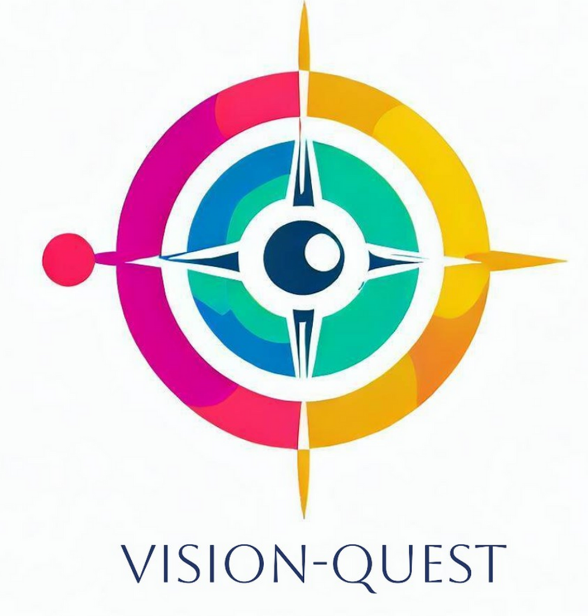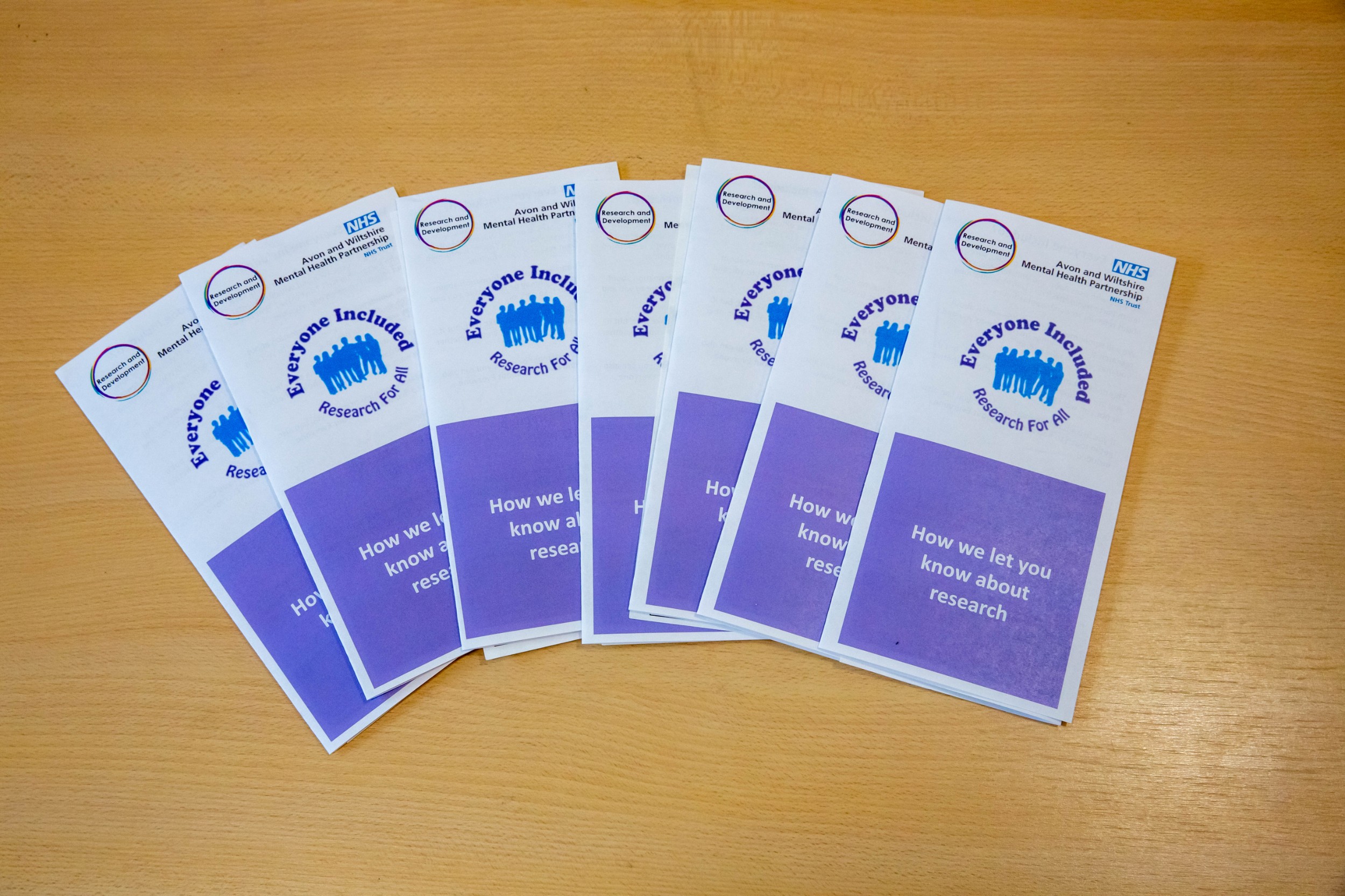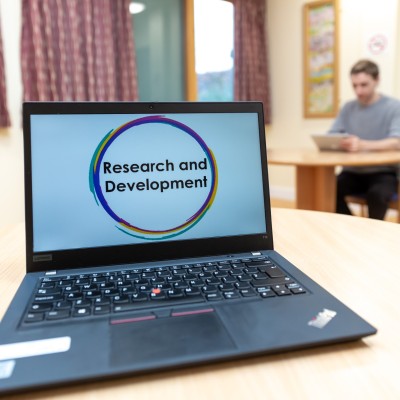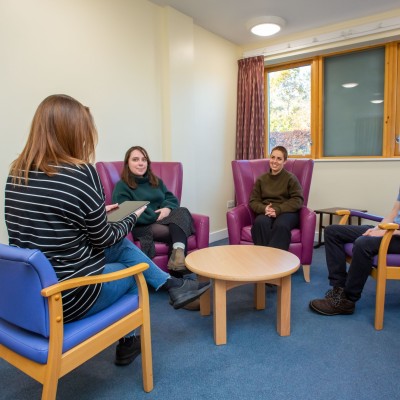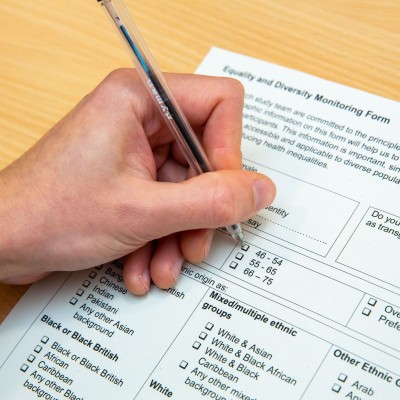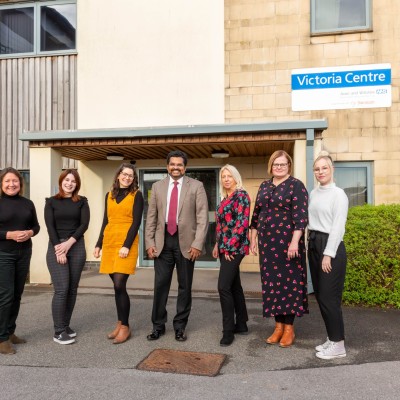What is Everyone Included?
Everyone Included is an approach we use to inform service users about ethically approved research studies being delivered within AWP. Everyone Included was relaunched in early 2022 after a pause during the COVID-19 pandemic. The approach helps to promote diversity and inclusion in research, which helps with our ambitions to create a culture of 'Research For All'.
Everyone Included is an opt-out postal system. This means that we consider that service users want to hear about relevant research opportunities by post, unless they inform us otherwise. This is important because service users have told us they want to make this decision themselves and be asked directly about research.
How does Everyone Included work?
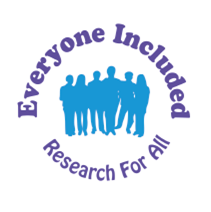 Service users are contacted by post, based on whether they fit the criteria outlined by a research study. These people are selected based on a variety of factors depending on what the study is about. Service users are sent a letter, which contains brief information about a research study and how to express an interest in taking part.
Service users are contacted by post, based on whether they fit the criteria outlined by a research study. These people are selected based on a variety of factors depending on what the study is about. Service users are sent a letter, which contains brief information about a research study and how to express an interest in taking part.
Service users can choose whether they would like to know more about the research study by responding to the letter. Service users can also ignore the letter, if there is no desire to take part in the research study. If service users choose not to take part, their care and treatment will not be affected.
Everyone Included was developed between 2012 and 2014. It was designed and developed with significant input from service users to ensure the design and implementation of the approach was suitable, relevant and appropriate.
Everyone Included was reviewed in 2018 to ensure that the approach meets the standards of General Data Protection Regulation (GDPR) 2018.
Before Everyone Included was relaunched in 2022, we reviewed the approach alongside service users. It was important for us to check that Everyone Included was still fit for purpose after eight years of use.
We asked service users about the approach and we received valuable feedback. This feedback helped us to simplify Everyone Included and make it more effective for the future.
Here are a few things that were changed, based on the feedback given by service users:
- The letters sent to service users were made clearer and shorter.
- The maximum time that service users can be approached about a research study was changed from six months post-discharge from AWP services, to two years (in some cases). It was agreed that this change would be useful, due to the varying nature of some mental health conditions. A person discharged from the service, could still make a valuable contribution to a research study.
- Service users will be contacted with details of a research opportunity if one is available. Previously, service users were provided with an introductory letter to the Everyone Included approach and then four weeks later, were contacted again with more detail about a research opportunity. This was considered confusing and unnecessary by service users. It was agreed that service users will only receive a single letter, combining information about Everyone Included and a relevant study opportunity.
- The process for service users to opt-out of Everyone Included was made clearer.
The Everyone Included will be continually reviewed, with consultation from service users, to make sure it is effective, inclusive and satisfies the needs of service users.
Opting out of Everyone Included
If service users no longer want to hear about research opportunities within the Trust, this is called ‘opting out’. Service users can opt out in several ways which include contacting the R&D team by phone or email. If an Everyone Included letter has been received, service users can opt out by completing the reply slip enclosed within the Everyone Included leaflet, and returning this slip to the R&D team, using the freepost envelope provided.
Service users can always opt back into hearing about research opportunities, if they have previously opted out. This can be done by getting in touch with the R&D Team using the contact details on this page.
Studies using Everyone Included:
The GLAD Study is a project set up to explore risk factors in individuals who have experienced depression and/or anxiety, including those with a diagnosis of bipolar disorder, OCD, or related disorders, at any time in their lives.
It aims to better understand depression and anxiety to find and develop more effective treatments. The GLAD Study is also part of the NIHR BioResource, which is a library of information about people’s health aiming to support research in both physical and mental health.
To take part in this study, people must:
- Have experienced symptoms of anxiety and/or depression during your life, or have never experienced any mental health condition
- Be aged 16 and above
- Live in the UK
The GLAD Study enrolment process consists of four steps:
- Register on the website www.gladstudy.org.uk and read the Information Sheet
- Provide consent (please put AWP as where you heard about the study)
- Complete a questionnaire
- Provide a saliva sample
Please note: The AWP Research and Development Everyone Included approach will only be used to contact AWP service users about the GLAD study, where they have accessed AWP clinical services within the past 6 months. The aforementioned eligibility critieria still apply, if people self-refer directly via www.gladstudy.org.uk
AWP Research and Development contacts:
Ali Young (alexandra
This study closes on the 01 September 2028
Visual hallucinations can be distressing and have a negative impact on people’s lives. There is little research into how visual hallucinations are experienced by those with non-affective psychosis.
The VISION-QUEST study aims to develop and test a new questionnaire to understand people’s beliefs about visual hallucinations. This questionnaire will also explore some physical and psychological factors thought to influence visual hallucinations.
To take part in this study, individuals must:
- Be aged 16 years or above
- Be diagnosed with non-affective psychosis; including schizophrenia, schizoaffective disorder, delusional disorder, psychosis not otherwise specified
- Be experiencing visual hallucinations within last month
- Be currently accessing AWP adult secondary care services
- Be willing and able to give informed consent
Individuals will not be able to take part in this study if they have:
- Insufficient English language to understand and complete questionnaires
- Visions as a result of organic disorder or brain injury, or when only under the influence of substances
Further information:
Those that take part will be asked to complete a questionnaire pack, which should take 30-45mins to complete. This pack can be completed either online or face-to-face with a researcher.
A payment of £10 or equivalent in shopping vouchers will be offered as a thank you for taking part in the study.
A small group that take part will also have the option to complete a similar questionnaire one week later. These questionnaires will take around 15 minutes to complete. These follow-up questionnaires will allow researchers to assess the new measure for visual hallucinations, which is being developed.
A second payment of £10 or equivalent shopping voucher will be offered as a thank you for completing the follow-up part of the study.
Contact:
This study closes on the 31 March 2026
